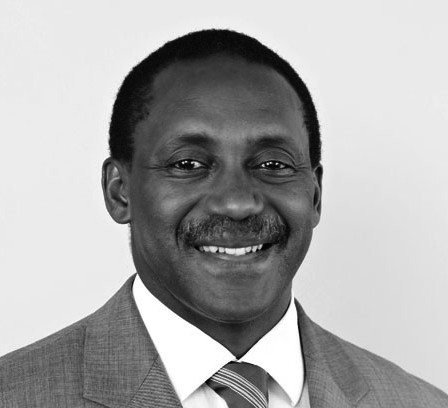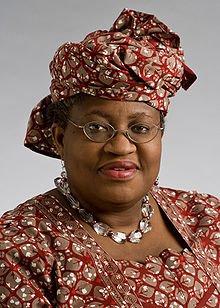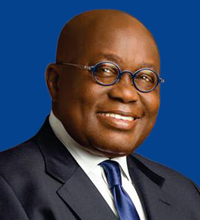 Statement By
Statement By
Dr. Kandeh K. Yumkella
Director-General UNIDO at the 20th African Union Summit Addis Ababa, Ethiopia
Excellency, Prime Minister Hailemariam Desalegn, Prime Minister of Ethiopia and
Chairperson of the African Union,
Distinguished Heads of State and Government,
Excellency, Dr. Dlamini Zuma, Chairperson of the African Union Commission,
Distinguished Commissioners,
Excellencies, Ladies and Gentlemen,
I am very grateful for the invitation of the Chairperson to address this August Assembly as you celebrate your 50thAnniversary and elaborate a vision for the African Renaissance. I was elected, with your kind support,as the first Director-General of the United Nations Industrial Development Organization to come from sub-Saharan Africa. In fact, almost eight years have passed since then, and we have had fruitful collaboration with the African Union and its Member States for the good of the entire Continent. I remember very well the first time I took the floor at an African Union Summit in my capacity as Director-General of UNIDO. That was in 2008. I felt honoured by the reception given to me by the leaders of Africa. But this feeling was tempered with a strong sense of humility, and above all, responsibility to advocate for Africa’s
industrialization. I remember delivering an angry and passionate speech on behalf of the Youth of Africa. I warned about a youth revolt; well, as they say, the rest is history.
It is with this same mixture of humility and responsibility that I stand before you today at our Golden Jubilee to deliver a message of "Hope Opportunity and Responsibility". Hope, because there is a positive change happening throughout the continent; opportunity because of the commodity boom; responsibility because we collectively (the people and our leaders) still need to create 10 million jobs a year for the youth, and lift the over 50% of our peoples who still live below $2 per day. 3 Let me convey at the outset my sincere gratitude to African Union Member States and to the African Union Commission for the excellent collaboration we have enjoyed over the years. Although this will be my last opportunity to attend an AU Summit as UNIDO Director-General, I am confident that the strong relations we have established will be nourished
and enhanced by my successor. Excellencies, With your support, we have together raised UNIDO’s profile as a trusted, efficient and effective partner for prosperity. UNIDO is now recognized as an agency with a highly relevant mandate, one that is focused on helping to
achieve international development goals, and dedicated to building partnerships within the UN system and beyond. By the end of 2012, under my administration, we have achieved results never seen in the organization’s 46-years history. For example, we doubled our annual mobilization of voluntary contributions, almost doubled technical assistance to countries, increased our cooperation with the European Commission from €15 million to about €100 million, increased collection of assessed contribution to over 90%, and significantly increased our assistance to Africa to $100 million (with another $ 200 million in the pipeline). I wish to take the opportunity to briefly reflect on how UNIDO has delivered for Africa over the past eight years. The main emphasis of my statement to you today, however, is a fresh look at the core issue of why industrialization matters if the "The African Rennaisance" (the Theme of Your Summit) is to be realized. In this regard, I wish to focus on the global conversation underway, that will lead to new global development objectives beyond the expiration of the Millennium
Development Goals in 2015. The setting of the post-2015 agenda is a once in a generation opportunity for Africa to ensure that its economic needs are recognized as a matter of global concern. It is imperative that Africans take the lead to define what the next set of development goals are.
More importantly, they should ensure that private sector wealth and job creation are at the core of the new agenda. THE LAST EIGHT YEARS During my tenure at UNIDO, there has been a significant increase in the number, types and quality of programmes that we have delivered in
Africa. All of these activities fit within the overall framework for Africa’s industrial development – the African Union Action Plan for the Accelerated Industrial Development of Africa (AIDA), formulated by the African Union Commission with UNIDO’s assistance, and endorsed by your Excellencies at the 2008 Summit. We have worked with various Commissioners to consolidate the economic pillars of AU's Mandate. Allow me to site a few examples of what UNIDO has delivered for Africa:
(i) We supported the AU to institutionalize the Conference of African Ministers of Industry. The Secretariats of NEPAD, the RECs, and the governments of Egypt, South Africa and Algeria, provided significant political leadership and technical support to ensure that CAMI becomes a viable organ of the AU.
(ii) A major focus on agribusiness development, with your support, the Accelerated Agribusiness and Agro-industries Development Initiative (3ADI) initiative endorsed by the AU Summit in 2010 has gained momentum and is being implemented in over 13 countries with over 10
more in the pipeline. The goal of the 3ADI is to have an agriculture sector in Least Developed Countries (LDCs) which, by the year 2020, is made up of highly productive and profitable agricultural value chains.
The initiative aims at accelerating the development of agribusiness and agro-industries sectors that ensure value-addition to agricultural products.
(iii) Trade capacity - building with a focus on improving quality infrastructure and standards, especially those related to agro- and food products. UNIDO has 5 assisted a number of African countries to establish metrology and standards laboratories, as well as training to staff through
national and regional networks.
(iv) Energy programmes with a focus on renewable energy development have also been a key priority for us during these eight past years. UNIDO has developed a number of mini-hydro projects and has taken a stand in advocating for much more large-scale investment in energy access for Africa.
(v) UNIDO has assisted many African countries in complying with various multilateral agreements, including the Montreal and Kyoto Protocols, and has developed a major programme on green industry, which holds great potential for this Continent.
(vi) Business, investment and technology services including industrial upgrading, SME and entrepreneurship development, investment promotion – including the establishment and scaling up of AfrIPAnet (with the support of the EU Commission), an Africa-wide investment promotion network. With your support, the development and management of industrial policy has been brought back to its rightful position in the process of economic diversification and structural change for African economies.
(vii) An additional programme that has been significantly scaled up during my tenure is that on pharmaceuticals. With financial support of the government of the Federal Republic of Germany, UNIDO has worked with the African Union and other international organizations such as WHO and UNAIDS, to develop the Business Plan of the Pharmaceutical Manufacturing Action Plan (PMPA). In cooperation with the Commissioner of Social Affairs, we will launch this plan in the second quarter of 2013. It is our hope that the plan will reduce the infiltration of fake drugs into African countries, but more importantly, that it will enhance private investments into domestic production of essential drugs (to lower the cost of medicines and enhance people's access to them).
MANUFACTURING MATTERS FOR AFRICA’S RENAISSANCE
Excellencies,
Africa is being recognized as the most dynamic growth region. We have done very well in the continent in the 1990s. Some recent reports have shown that currently 6 out of the 10 fastest growing economies are in Africa. Average GDP growth rates since 2001 are about 5%. However, the reality is that in 2005, SSA was the world's poorest region with just over 50% of its population living on less than $1.25/day, (This is similar to 25 years ago). In fact, the income gap between Africa and other developing regions has been widening over the past 40 years (meaning that others are growing even faster). Growth in most other regions is driven by structural change to manufacturing and value-added services; but in Africa, growth has been driven by a commodity exports boom. This must change in the next 20 years; we must be the next industrial frontier in the 50 years.
NATURAL CAPITAL SHOULD FINANCE DIVERSIFICATION
Another good news is that Africa is more popular today for forging new partnerships than ever before. In fact, it is obvious that there is anew scramble for Africa. Every major economy is trying to make a deal with one of your countries to own a piece of your real estate for minerals or agricultural production. Partnerships are crucial and necessary for global prosperity (but the nature and content of the deals also matters). Will the partnerships generate domestic wealth creation, will they enable economic diversification, will they be environmentally friendly, and will they guarantee prosperity for future generations?
Empirical evidence of the dynamic role of industrialization in development is not hard to find. Annual statistics published by UNIDO, UNCTAD and UNECA chart the close association between growths in manufacturing value added (MVA) and GDP. The experience of Europe, the United States, Japan, and now China demonstrates how concerted efforts to build productive capacity and rapidly diversify the economy act as a spur to economic growth and prosperity. Why should Africa expect any less? A recent Foreign Policy Magazine article observes that "from late 15th century England all the way up to the East Asian Tigers of recent renown, development has generally been taken as a synonym for industrialization. Rich countries
figured out long ago, if economies are not moving out of dead-end activities that only provide diminishing returns over time (primary agriculture and extractive activities such as mining, logging, and fisheries), and into activities that provide increasing returns over time (manufacturing and services), then you can't really say they are developing" (Rick Bowden, FP, January 27, 2013 "The Myth of Africa's Rise"). The same article shows that in Africa today, the share of Manufacturing Value Added (MVA) in GDP is about 11% (Asia 35%); share in global MVA was 1.1%, share of global manufactured exports was less than 1.3% in 2008. In fact 23 countries have negative MVA per capita. In short, Africa's relevance in the global economy today seems to be merely as a source of raw materials as it was in the 17th century. (This picture must change during the African Renaissance of the next 50 years). Unambiguously, sustained industrial growth leads to a significant reduction in poverty. Increased productivity through moving from reliance on primary commodities to ever-more sophisticated production of manufactures and development of related service sectors is a proven way of pulling people out of poverty and in driving poorer countries forward. Ordinary people benefit both through opportunities for formal wage employment and through rising wages. Typically, formal wage jobs are more secure and better paid, and offer greater scope for skill accumulation than either self-employment or informal wage work. This is particularly important for gender equity (equality) as labour-intensive manufacturing is a key source of wage employment for women. Where 8 manufacturing does not develop, women have fewer opportunities to gain economic status. Building productive capacity plays a pivotal role in encouraging technological development; increasing productivity; promoting entrepreneurship; generating employment and income; and creating sectoral linkages, including those with the agriculture and service sectors. A new McKinsey study finds that manufacturing continues to provide a path to middle-income or wealthy nation status for developing countries, especially through its contribution to productivity, innovation and trade. McKinsey’s research uncovers the complex and nuanced role that production itself plays in maintaining and developing a country’s innovative and industrial capabilities – in other words, the right mix of policy choice and investment in productive capacity can strongly reinforce and multiply technology and knowledge transfer.
AFRICA AND THE WORLD BEYOND 2015
Given all that I have said, one would imagine that the elements of inclusive and sustainable industrial development should be at the top of the list in discussions on the new development framework beyond 2015. And indeed, I do expect that the Secretary-General’s High-level Panel will look closely at the role of economic growth; and that the Open Working Group of Member States on Sustainable Development Goals – which holds its first meeting in Liberia in the coming days – will seek to grasp the growth, development and sustainability nexus. I also have strong expectations concerning how these groups will approach one issue in particular – that of sustainable energy for all to power growth and prosperity– but I will come back to this shortly.
The crux of the matter is not so much whether the need for broad-based sustainable growth will be acknowledged, but rather what role will be accorded to global action. The MDGs’ great success, we are told, lay in their clarity, simplicity and outcome-oriented nature. It is relatively easy to communicate the need to provide education or maternal 9health, and to agree on related global goals. It is less easy to establish a global goal or, say, the inclusivity of economic growth, much less the industrial share of the economy. To some commentators, this alone precludes a role for economic growth and industrial development in the post-2015 goals. Others cite as
reasons a reluctance to return to the days before a more human-centered approach to development, or uncertainty about the environmental and resource impacts of expanding the
productive capabilities of African countries. However, I believe this is a false dichotomy between economic development and social development. Let me allay some of the concerns and
set out a vision for how we can bring the growth of our Continent back into the development equation. There is need to maintain the simplicity of the MDGs. I wholly agree that we need clear and graspable global goals. Some of those may be refinements of the current MDGs – and indeed, the complete eradication of poverty in all its forms should be paramount. But we need more. We need positive action, and we need a positive narrative – not only for the poor of developing countries, but also for the taxpayers worldwide who will be asked to provide development financing at a time of continued economic strain. What I call for is a new partnership for sustained prosperity, supporting the achievement of new goals and the well being of all mankind. And a key element of this partnership must be investing into productive capacity, job creation, structural transformation and economic diversification (according to national and regional needs).
So, in addition to universal education, we must call for skills-formation to make the youth employable, or more productive, or to become entrepreneurs themselves; to complement food security, we must call for agribusiness development to create rural wealth to stem the mass migration of people to urban areas; emphasize private sector wealth creation beyond mundane poverty alleviation (for you cannot eradicate poverty without creating wealth).
As far as the environment and natural resources are concerned, there is no doubt that effects on climate change, biodiversity, and spoiling of the global commons must be central to any consideration of economic growth. For Africa and the world, resource efficiency will play an increasingly important role in the context of stability, security and development. Inefficient technologies and operating practices currently in use by many industries in developing countries will need to be replaced. Massive investments are needed for climate change mitigation and adaptation and other dimensions of environmental protection of global ramifications. Such investment will come about only through collective action of the type foreseen in last year’s Rio+20 Outcome Document, and must be at the heart of support for the post-20
15 goals.
POWERING THE AFRICAN RENAISSANCE
Excellencies,
Ladies and Gentlemen,
I mentioned earlier that my time as UNIDO Director-General is drawing to a close. One of the greatest impacts UNIDO has had on the global development landscape in recent times has been its role, through supporting UN-Energy and the Secretary-General’s Advisory Group on Energy and Climate Change, in elaborating tangible and achievable energy targets. In the close of last year, I had the honour to be appointed as the Special Representative of the Secretary-General on Sustainable Energy for All, and Chief Executive Officer of the Sustainable Energy for All Initiative. As I transition fully to my new role, I can assure you that I will redouble my efforts to work with the AU and NEPAD to promote the Plan for Infrastructure Development in Africa (PIDA), which has at its core the scaling up of investments in the energy sectors. Access to modern forms of energy is one of the most pressing challenges facing this Continent, and is central to the three dimensions of sustainable development. Total installed capacity for power generation in 43 countries of Sub-Saharan Africa (minus South Africa) is less than or about the capacity in
Poland and in the State of New York. Outside RSA, modern energy consumption in SSA is around 1% of OECD levels, 82% of households rely on solid biomass for cooking (charcoal, wood, or animal waste), interruptions cause 2-3% loss of GDP and 6% loss to turnover in the formal sector firms. Without access to energy, a country or community cannot achieve the MDGs. Hence, Africa must push for "Universal Access to Sustainable Energy" to now become a development goal ( it is the means to power wealth and jobs creation, women’s economic and social empowerment, education, food security and access to clean water).
Without an ambitious transformation of global energy production and use, climate change will worsen (energy generation and use account for almost 70% of green house gas emissions). For this and other reasons stated earlier, the Secretary General Ban Ki Moon has launched the Sustainable Energy for All initiative, which has established three interlinked and complementary global targets: (a) ensuring universal access to modern energy services; (b) doubling the rate of improvement in energy efficiency; and (c) doubling the share of renewable energy in the global energy mix. The initiative has received overwhelming political support, and the pr
ivate sector is fully on board. In Rio+20, we received over $50 billion in commitments towards actions under the initiative. The UN-General Assembly last month declared a Decade for Sustainable Energy for All (2014-2024). My new job is to facilitate the conversion of "Commitments-to-Kilowathours for People" (C2K), and for supporting governments to do for the energy sector what they did for mobile phones (deregulate-unbundle the sector and incentivize private sector participation). Note that from 2000-2012 over 700 million mobile phone connections were made). Let us jointly create the new Third Industrial Revolution powered by an Energy-Internet through decentralized and distributive modern energy services. I count on your continued support and guidance in my new post.
CONCLUSION
Excellencies,
In closing, I am pleased to say that I remain very optimistic about the future of Africa’s development. Africa is currently the fastest growing region in the world – even overtaking Asia. Africa’s renaissance – the theme of this summit – is within reach. But that renaissance will depend on political will and on making the right choices for the Continent as a whole. We must make sure that Africa’s economic potential is supported in future global development goals – through emphasizing investment in productive capacity, access to sustainable energy, and other pressing needs. Only then will we witness the renaissance become a reality.
Thank you.
21-28 January 2013



